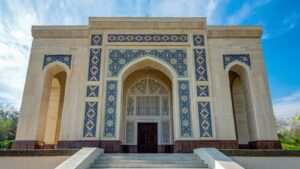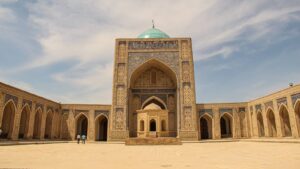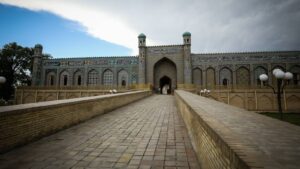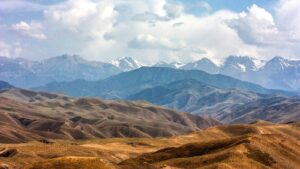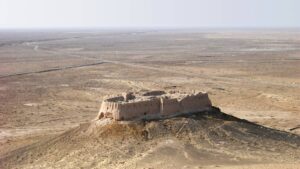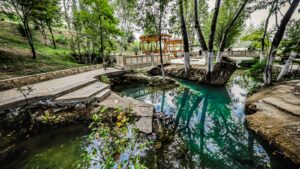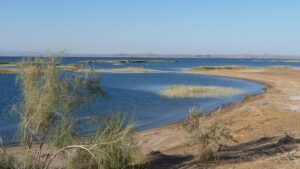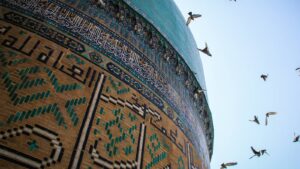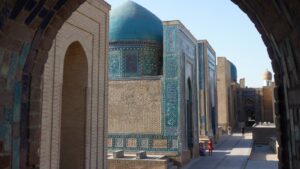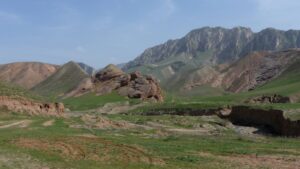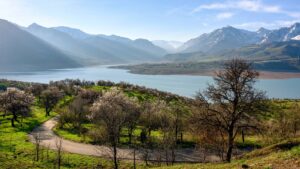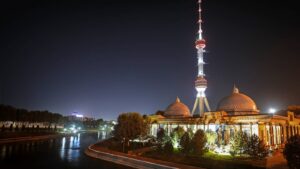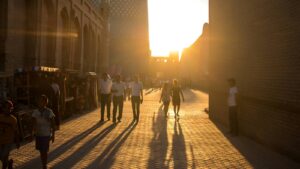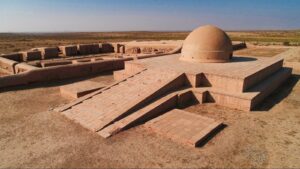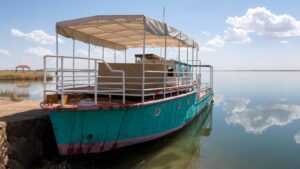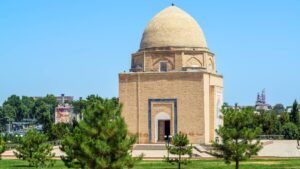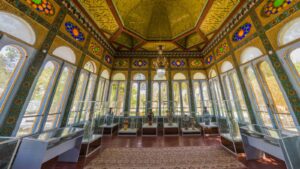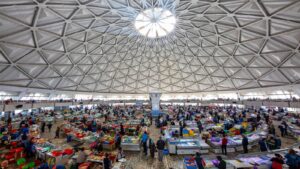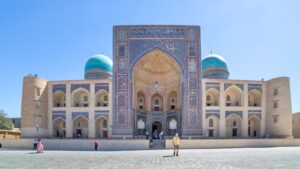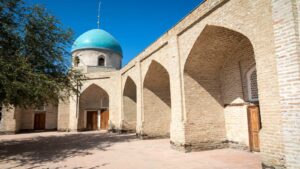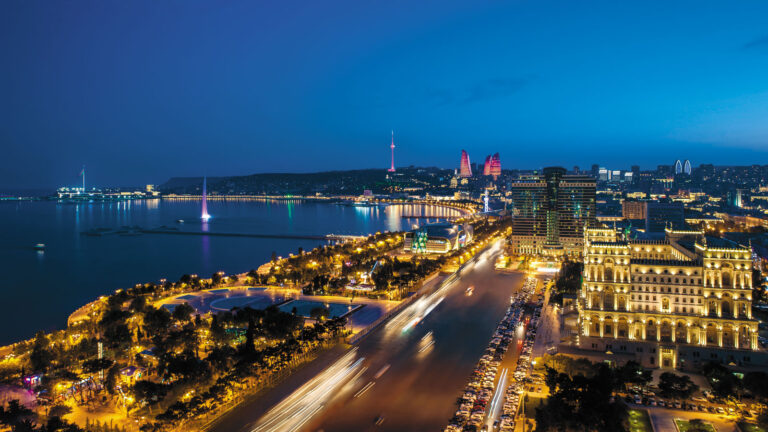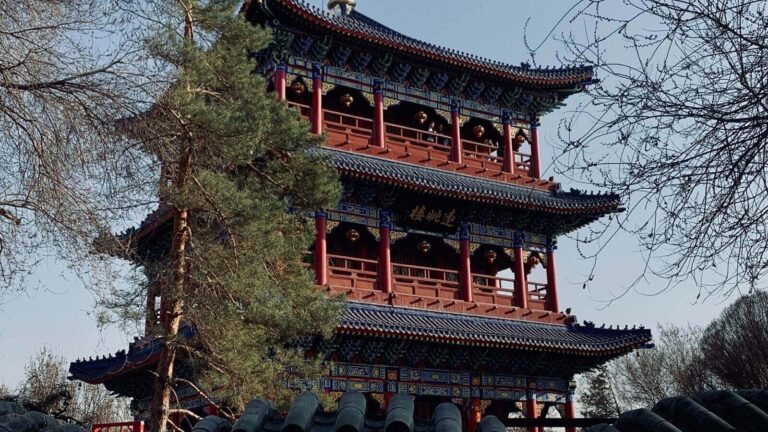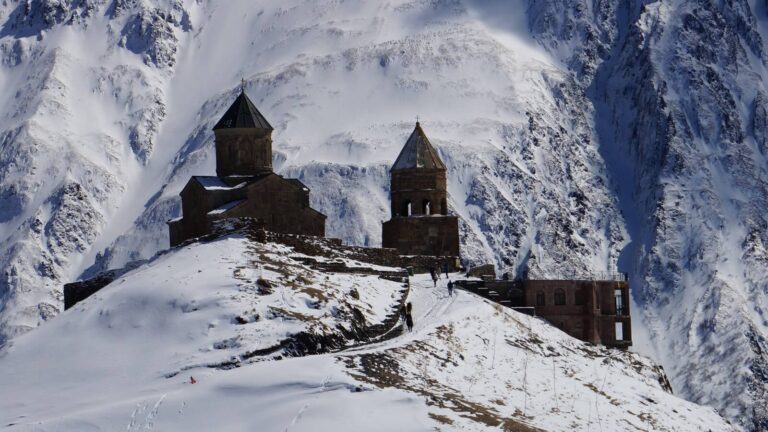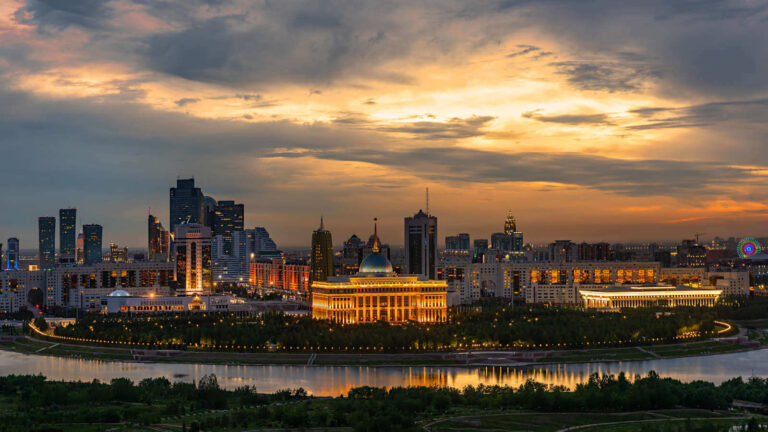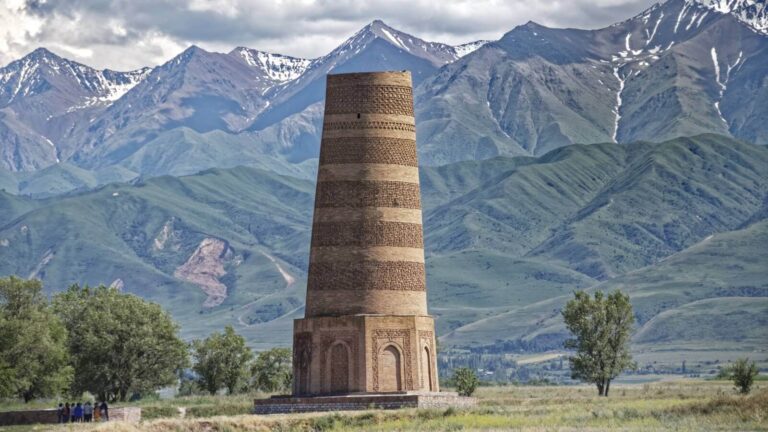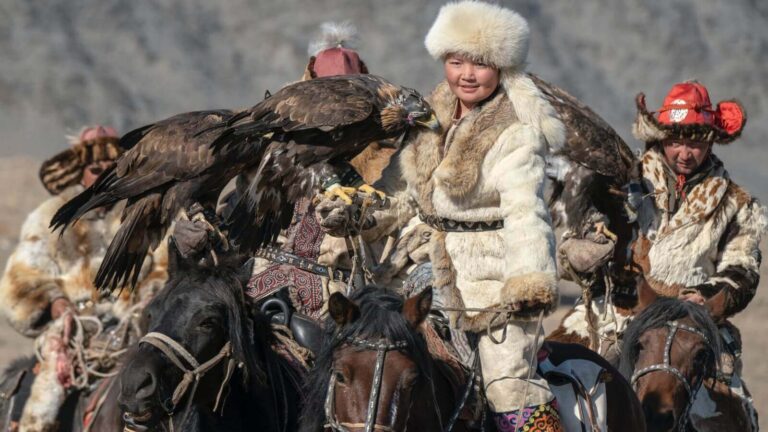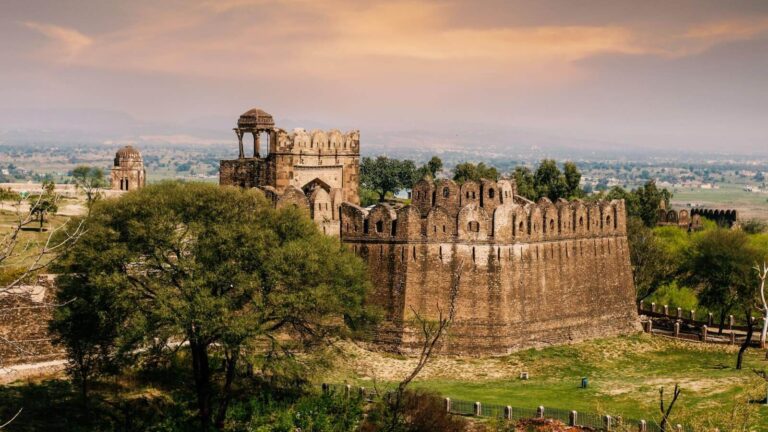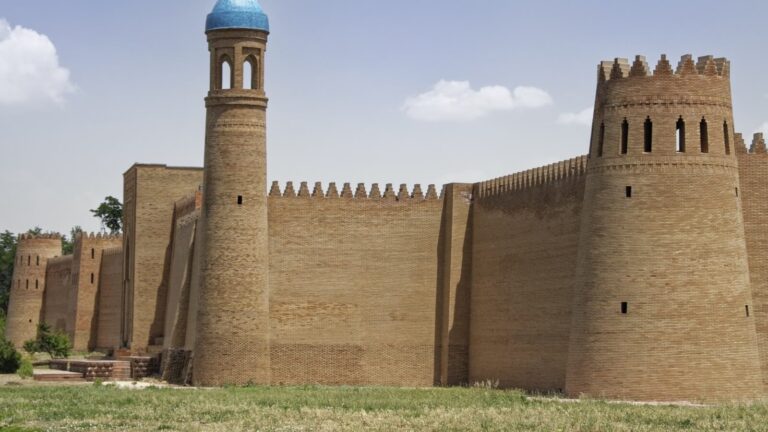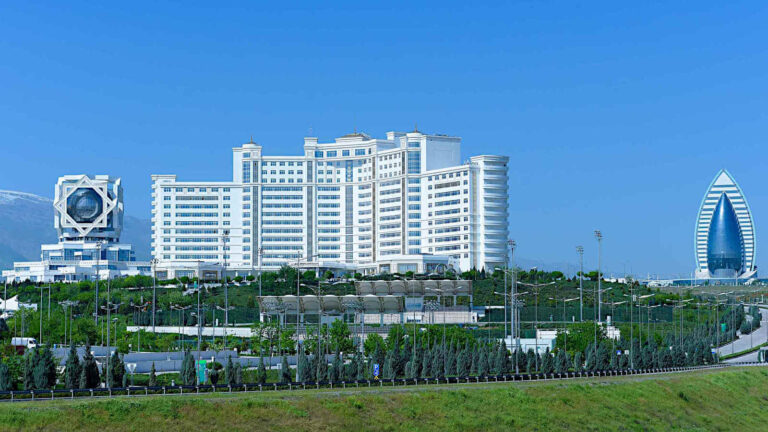Welcome to Uzbekistan,
Located in the very heart of Central Asia, Uzbekistan is a land where ancient history, mesmerising architecture, and rich cultural heritage converge. Uzbekistan beckons travellers with its awe-inspiring landmarks and warm hospitality, boosted by fast transport links and charming historic accommodation.

Language: Uzbek
Currency: Uzbek som
Capital City: Tashkent
Population: 34 million
History
Uzbekistan has a rich and storied history that spans over several millennia. The region was home to ancient Persian civilisations such as the Bactrians and the Sogdians. In the 8th century, it became part of the Islamic Caliphate, ushering in a period of Islamic influence.
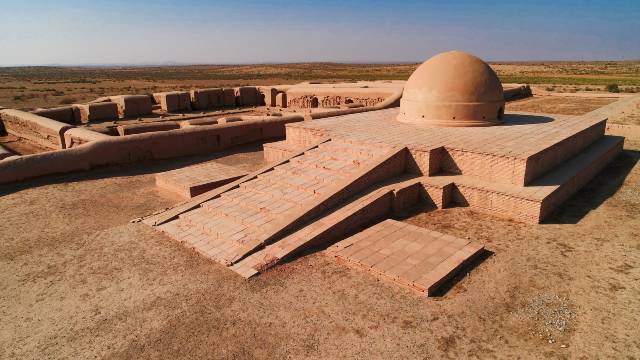
The region later fell under Mongol rule before the establishment of various Uzbek khanates in the 15th century. In the 19th century, the area came under Russian control and eventually became a Soviet republic in 1924. Uzbekistan gained independence in 1991 following the collapse of the Soviet Union.
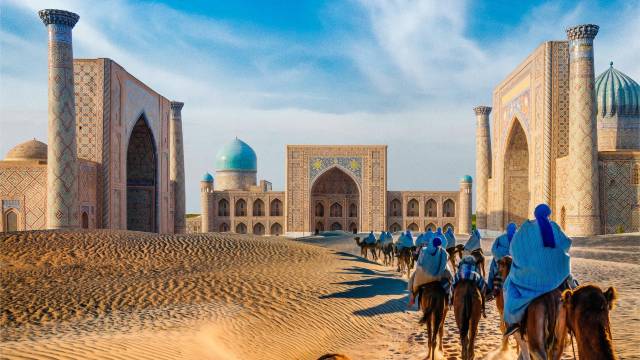
Throughout its history, Uzbekistan was a significant part of the famous Silk Road, serving as a crossroads for trade and cultural exchange between East and West. Today, the country is proud of its historical legacy and preserves many ancient cities, architectural masterpieces, and cultural traditions that showcase its rich past.
Geography and Nature
Uzbekistan boasts a diverse geography and abundant natural beauty. The country is characterised by vast plains, rugged mountains, and fertile valleys. The Amu Darya and Syr Darya rivers flow through Uzbekistan, providing water for irrigation and sustaining a variety of ecosystems.
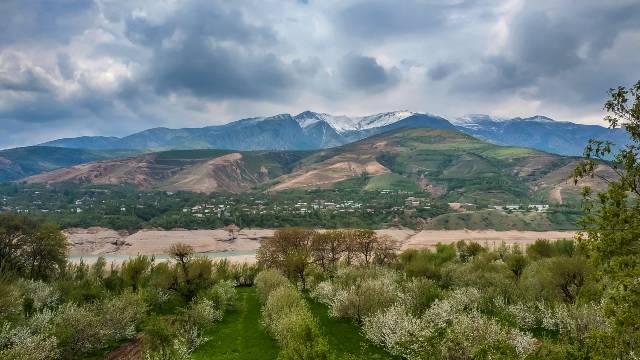
The flora of Uzbekistan includes diverse species of trees, shrubs, and flowering plants, with the pistachio, almond, and walnut trees being notable examples. In terms of fauna, the country is home to a range of species, including rare and endangered animals.

The Kyzylkum Desert in the south is known for its reptiles, including the Ural monitor lizard and the Central Asian cobra. The mountains of Uzbekistan are inhabited by snow leopards, lynxes, and wild boars.
The Aral Sea region, though greatly affected by environmental changes, still supports bird species like pelicans, flamingos, and herons.
Economy
Uzbekistan is one of the world’s largest producers of cotton. It also cultivates other agricultural products such as fruits, vegetables, and grains.
In recent years, Uzbekistan has been implementing economic reforms to attract foreign investment and promote private sector development. The government has focused on diversifying the economy by supporting industries such as textiles, automotive, pharmaceuticals, and construction. Tourism has also emerged as an important sector, with the country’s rich cultural heritage and historical sites attracting visitors from around the world.
The country has significant reserves of natural resources which remain untapped, including natural gas, coal, and precious metals.
Uzbekistan has been actively participating in regional integration initiatives, including the development of transport and energy infrastructure projects. The country has improved its business environment by simplifying administrative procedures, enhancing trade facilitation, and promoting entrepreneurship.
Overall, Uzbekistan’s economy is experiencing positive growth and diversification, creating opportunities for both domestic and international investors.
People and Culture
The country’s diverse cultural heritage is complemented by its warm and welcoming people. Engage with local artisans in the Silk Road cities, learn the secrets of traditional carpet weaving, or witness the craft of papermaking in Samarkand. Experience the hospitality of Uzbek families as you share a meal and gain insights into the local way of life.
The culture of Uzbekistan has a rich history, which has been inextricably linked with centuries-old traditions and way of life of the peoples of Central Asia. Ancient Persians, Greeks, nomadic Turkic tribes, Arabs, Chinese, Russians made their contribution to it.

The Great Silk Road, having played a significant role in the development of the culture of Uzbekistan in antiquity, favored not only the exchange of goods, but also the exchange of technologies, languages, ideas, religions. Traditions and customs of multinational Uzbekistan are reflected in music, dance, fine and decorative arts, language, cuisine and clothing. At the same time, own unique features and traits are prevailed in the culture and art of each region of the country.
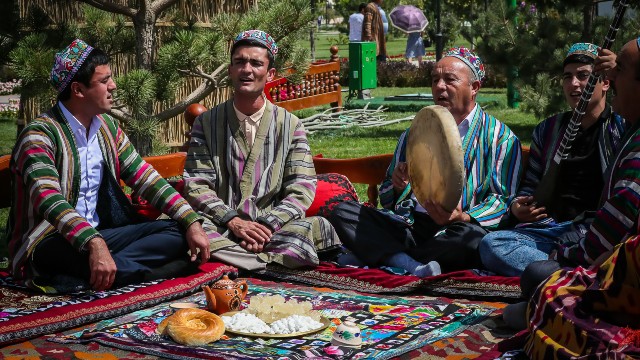
Developed over the centuries, the traditions and customs of the Uzbek people are very original, bright and diverse, and go back to different eras and religions. A large number of ceremonies are associated with the birth and upbringing of a child, weddings, engagements, etc.

Traditional oriental hospitality is no stranger to the peoples of Uzbekistan. The ability to receive a guest is valued by Uzbeks over the wealth of the table itself or the wealth of the family. Not treeting guests well meant dishonoring the clan, family.
Important Dates
- January 1: New Year’s Day
- March 8: International Women’s Day
- March 21: Navruz (Persian New Year)
- May 9: Victory Day (commemorating the Soviet Union’s victory in World War II)
- September 1: Independence Day
- December 8: Constitution Day
- Islamic holidays such as Eid al-Fitr (celebrating the end of Ramadan) and Eid al-Adha (Festival of Sacrifice) are observed based on the lunar calendar.
International flights connect to major cities like Tashkent, Samarkand, and Bukhara, while land borders allow entry from neighbouring countries. The well developed railway network provides an alternative way to arrive, and domestic flights and buses offer convenient transportation within the country.
By Plane

Uzbekistan is well connected to the international air travel network, with several key airports serving as entry points for travellers. The primary airport is Tashkent International Airport (TAS), located in the capital city of Tashkent. It is the largest and busiest airport in the country, serving as a hub for both domestic and international flights. Other major airports include Samarkand International Airport (SKD), Bukhara International Airport (BHK), and Urgench International Airport (UGC), which cater to regional and international travel.
Several major airlines operate flights to Uzbekistan. Uzbekistan Airways, the national carrier, provides both domestic and international flights. Additionally, international airlines such as Turkish Airlines, Aeroflot, Emirates, and Air Astana offer routes to and from Uzbekistan.
By Train
Traveling to Uzbekistan by train offers a scenic and convenient option for visitors. The national railway company, Uzbekistan Railways, operates an extensive network that connects major cities within the country and provides international connections with neighbouring countries.
The official website of Uzbekistan Railways (www.uzrailway.uz) provides information on train schedules, routes, and ticket reservations. It is recommended to book tickets in advance, especially for long-distance or popular routes.

Trains in Uzbekistan vary in comfort and amenities, ranging from modern high-speed trains to traditional sleeper trains. The trains are equipped with comfortable seating or sleeping berths, dining cars, and onboard facilities. Traveling by train allows you to enjoy the beautiful landscapes of Uzbekistan and provides an opportunity to interact with Uzbeks during the journey.
By Car
Traveling to Uzbekistan by car offers the flexibility to explore the country at your own pace.
The main land borders and checkpoints for entering Uzbekistan by car include the Oybek border crossing with Tajikistan, the Dostyk border crossing with the Kyrgyz Republic, and the Chernyaevka border with Kazakhstan.

By Bus
Getting to Uzbekistan by bus is a feasible option for travellers seeking an affordable and adventurous journey. The country is well connected by bus routes with neighbouring countries such as Kazakhstan, the Kyrgyz Republic, Tajikistan, and Turkmenistan. However, it’s important to note that bus travel may involve longer travel times and varying levels of comfort.
Some border crossings may involve additional immigration and customs procedures, so be prepared with the necessary documents and allow ample time for the process.

Bus schedules can be found on https://tashtrans.uz/mezhdunarodnye-marshruty-tashkenta/
Uzbekistan experiences a continental climate with hot summers and cold winters. The weather and climate can vary significantly across different regions of the country.
Summers (June to August): Summers in Uzbekistan are hot and dry, with temperatures often exceeding 40°C (104°F) in some areas, particularly in the low-lying desert regions.
Autumn (September to November): Autumn brings pleasant temperatures, with cooler evenings. It is a popular time to visit as the weather is mild and comfortable, making it ideal for outdoor activities and exploring historical sites.
Winters (December to February): Winters in Uzbekistan are cold, especially in the northern and mountainous regions, with temperatures dropping below freezing.
Spring (March to May): Spring is characterised by mild temperatures and occasional rainfall. It is a beautiful time to visit as the landscapes come alive with blooming flowers and greenery.
UZBEKISTAN WEATHERDiscover Uzbekistan’s best Destinations on each Season
It’s important to note that entry requirements may vary depending on your country of citizenship.
Some travellers to Uzbekistan require a visa, while others can visit visa-free. If you need a visa, you can apply through the Uzbekistan e-Visa system.
Please note that entry requirements and regulations may change, so it’s essential to check the latest information before your trip to ensure a smooth entry into Uzbekistan.
For detailed and up-to-date information on entry requirements, it is advisable to visit the official website of the Ministry of Foreign Affairs of Uzbekistan or contact the nearest Uzbekistan embassy or consulate in your country.
More information here https://uzbekistan.travel/ru/pamyatka-turistu/#top1
Check requirements on http://ssv.uz/ru
When driving in Uzbekistan, there are certain key requirements and considerations to keep in mind. Here is a summary of the key requirements and some important warnings:
You must have a valid driving license from your home country and/or an International Driving Permit (IDP) to drive in Kazakhstan.
Ensure that your vehicle is properly registered and has valid insurance coverage. It is recommended to carry the vehicle registration documents and proof of insurance while driving.
Be aware that road conditions in certain areas of Uzbekistan may vary, with some remote regions having limited infrastructure and rough roads. Exercise caution and adjust your driving accordingly.
Exercise caution while driving, especially in urban areas where traffic can be congested and unpredictable. Be vigilant for potential hazards and follow recommended safety practices.
More information is available on https://yhxbb.uz/ru/menu/zakony-ob-pdd
Main Regions of Uzbekistan
Transportation within Uzbekistan offers various options for travellers to explore the country. Here is a summary of the different modes of transport available:
Driving: Renting a car or driving your own vehicle allows for flexibility in exploring Uzbekistan. Major cities have well maintained roads, but rural areas may have more basic road infrastructure. It’s important to have a valid international driving permit and familiarize yourself with local traffic rules. Car rental services are available in major cities.
Bus: Buses are a common mode of transport for both short and long distances within Uzbekistan. The country has an extensive network of intercity buses connecting major cities and towns. The buses are generally affordable and provide a convenient way to travel between destinations.
Taxis and Ride-Sharing: Taxis are readily available in urban areas and can be hailed on the street or booked through mobile applications. It’s advisable to negotiate the fare before the journey or ensure the taxi meter is used. Ride-sharing services like Yandex.taxi and Yango are widely available.
Train: Uzbekistan has a well-developed railway network connecting major cities and regions. Trains are a popular and comfortable mode of long-distance travel. The national railway company, Uzbekistan Railways, operates various train services, including high-speed trains and overnight sleepers. Train schedules and ticket reservations can be made through the official Uzbekistan Railways website.
Air Travel: Domestic air travel is an efficient way to cover long distances within Uzbekistan. The country has several airports, including the international airports in Tashkent, Samarkand, Bukhara, and Urgench. Uzbekistan Airways is the national carrier and offers domestic flights between major cities.
Electricity: Uzbekistan operates on a standard voltage of 220-240V, with a frequency of 50Hz. Type C and F power plugs with two round pins are commonly used. It is advisable to carry a universal adapter for charging electronic devices.
Phones: Uzbekistan has a well-established mobile network infrastructure. Purchasing a local SIM card is a convenient option for staying connected. The main mobile operators in Uzbekistan are Ucell, Beeline, and UMS. The country code for Uzbekistan is +998.
Wi-Fi Access: Wi-Fi access is available in many hotels, restaurants, cafes, and shopping malls in major cities like Tashkent, Samarkand, and Bukhara. However, the availability and quality of Wi-Fi may vary. Find free Wi-Fi spots in Tashkent here.
Postal Services: Uzbekistan has a postal system that provides both domestic and international mail services. The national postal operator is Uzbekiston Pochtasi. It’s advisable to allow sufficient time for international mail to reach its destination.
Hotels: Uzbekistan has a variety of hotels ranging from luxurious international chains to smaller boutique hotels. Hotel booking websites like Booking.com, Agoda, and Expedia provide listings and online reservations for hotels in Uzbekistan.

Vacation Rentals: Vacation rentals, such as apartments and houses, are becoming increasingly popular among travellers. These options provide a more homely and flexible experience, especially for families or those seeking an extended stay. Websites like Airbnb and HomeAway offer listings of vacation rentals in Uzbekistan.
Budget Lodging: For budget-conscious travellers, there are guesthouses, hostels, and budget hotels available in major cities and tourist destinations. These accommodations offer basic facilities and are more affordable than upscale hotels. Booking platforms like Hostelworld provide options for budget lodging in Uzbekistan.
Camping & RVs: Camping and RV options are available for travellers who prefer outdoor experiences. Some national parks and designated camping sites allow camping, although facilities may be limited.
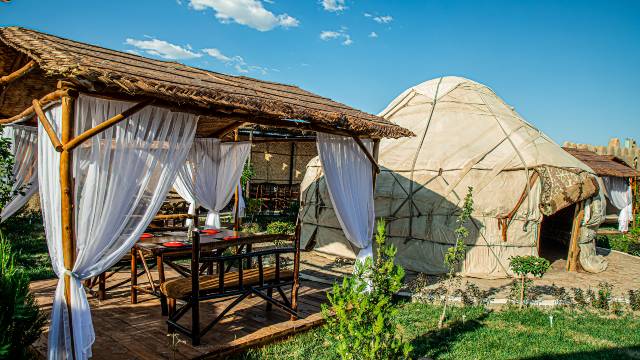
Uzbekistan’s culinary delights will tantalise your taste buds. Indulge in plov, succulent kebabs, and flavourful Uzbek pastries while lounging on a traditional topchan, a raised platform for cross-legged dining. A dining session in Uzbekistan can take hours as your hosts invite you to sip on endless cups of fragrant green tea, and bring on heaped plates of sliced watermelon.

Each dish in Uzbek cuisine has a special place in culture and can be prepared differently in different regions of the country. As an example, in the north preference given to plov, fried meat, dough products and flat bread, while in the south are cooked many types of rather complex dishes consist of rice and vegetables, and also excellent desserts.

The official currency of Uzbekistan is the Uzbekistani Som (UZS). While major hotels, restaurants, and upscale stores in larger cities accept credit cards, it’s important to carry cash, especially in smaller towns and rural areas where cash is the preferred payment method. Visa is the preferred card in Uzbekistan. Get live exchange rates here.
Money Transfers: International money transfers can be made through banks and authorised money transfer services like Western Union.
Business Hours: Most shops, markets, and malls in Uzbekistan are open from around 9:00am to 7:00pm, Monday to Saturday. Some businesses may close for a few hours during lunchtime. On Sundays and national holidays, some establishments may have reduced operating hours or be closed.
Unique Products: Uzbekistan is known for its rich handicraft traditions, including ceramics, textiles, embroidery, carpets, and woodwork. Traditional Uzbek products like silk, suzani textiles, and hand-painted ceramics make for unique souvenirs. Haggling is a common practice in Uzbekistan’s markets and bazaars. Keep in mind that quality and authenticity can vary. Explore local bazaars, craft markets, and artisan workshops to find authentic and locally made products. A trusted guide can help you find the perfect souvenir.
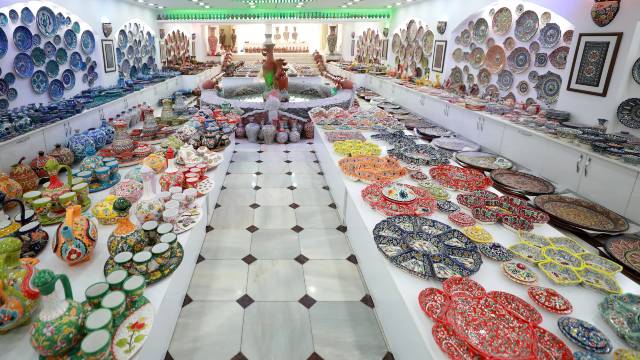
Dress Code: In general, Uzbekistan has a conservative dress code. It’s recommended to dress modestly, covering the shoulders, knees, and avoiding revealing clothing, particularly when visiting religious sites or rural areas. Avoid public displays of affection, especially outside of major cities.
Tipping: Tipping is not a traditional practice in Uzbekistan, but it has become more common in tourist areas. It’s appreciated to leave a small tip for good service in restaurants, hotels, or for tour guides. However, tipping is discretionary and should be based on the level of service received.
Alcohol, Smoking, Video, and Photography: It is prohibited to consume alcohol in public places, except in licensed establishments. Smoking is generally allowed in designated areas. When taking photos or videos, it’s important to ask for permission, especially when photographing people.
Religion: Uzbekistan is a secular country, there is no orthodox Islam, but Islam is the main religion in the country. If you go to a local mosque, there are some rules to follow. Men and women should both dress modestly, in looser-fitting clothing that covers the arms and legs—no shorts or sleeveless shirts for either gender. Women should also bring a scarf. Not all mosques will ask female visitors to cover their heads, but it’s a sign of respect to have one ready.
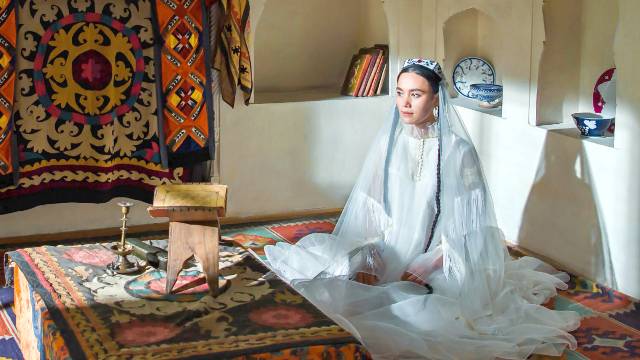
Staying Safe while Travelling: It is generally safe to travel in Uzbekistan, but it’s advisable to take common-sense precautions. Stay vigilant, especially in crowded areas and public transportation. Keep your belongings secure and be cautious of pickpockets. It’s recommended to use reputable transportation services and avoid walking alone at night in unfamiliar areas.
Medical Treatment and Emergencies: Uzbekistan has both public and private medical facilities, but the quality of care may vary. It’s recommended to have travel insurance that covers medical treatment and evacuation. Carry essential medications and a first aid kit. In case of a medical emergency, dial the local emergency number or seek assistance from your accommodation or local authorities.
Emergency Services: In case of emergencies, contact the local authorities or emergency services. The general emergency number in Uzbekistan is 101 for police, 102 for fire, and 103 for medical emergencies.
Tourist police: In order to ensure the safe stay of tourists in Uzbekistan, since 2017, the Tourist Police has been deploying in many tourist sites of the country. The main tasks of this force is to monitoring the state of safe tourism, informing guests about potential threats in real time, as well as helping to protect their rights and legal interests.
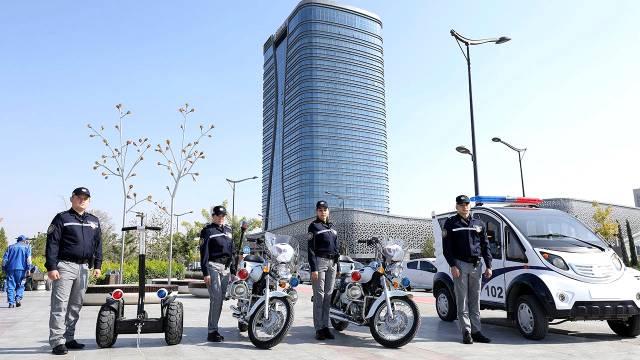
In case of Emergency
Police: Dial 102
Tourism Related Sites
- National Tourism Web Portal https://uzbekistan.travel/ru/
- Website of the State Committee for Tourism Development https://uzbektourism.uz/ru
- The website of the Ministry of Health http://ssv.uz/ru
- Ministry of Internal Affairs website https://iiv.uz/ru





